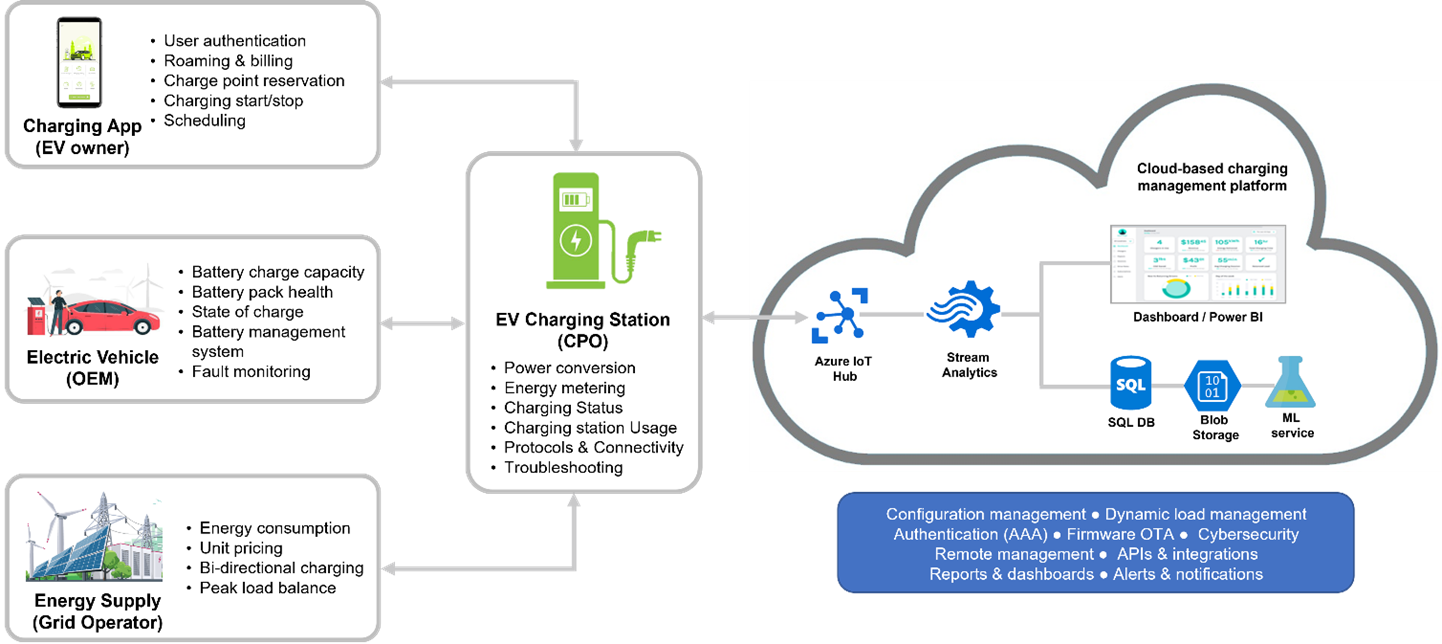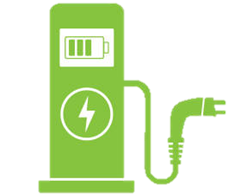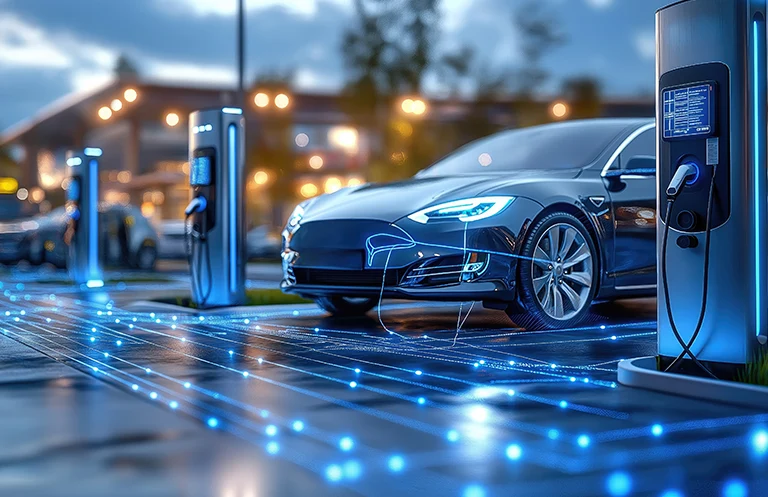This is the fourth blog in a series of ‘Digital transformation in EV charging value chain’ and it focuses on the growing needs of IoT in managing real-time operations and helping the EV charging industry to scale to new heights.
Introduction
Unlike the non-networked gasoline fuel stations, the EV charging stations are connected devices and integrated with various third-party service providers such as energy suppliers, e-MSPs, and charge point operators. They use various protocols & connectivity options and back-end cloud infrastructure to ensure seamless charging operations such as payment processing, software updates, scheduling, predictive maintenance, and usage analytics.
Besides all the factors favoring EV adoption, the key to success lies in the development of robust charging infrastructure. The real challenge is not about installing a large number of charging stations, but the ability to remotely manage and smoothly operate dispersed devices.
Before we move ahead and discuss how IoT helps to address this problem, let’s understand some of the key challenges ahead of EV charging infrastructure management –
- High costs associated with field visits for troubleshooting charge points.
- Every minute of downtime results in lost business and customer discontent.
- Lack of mechanisms to optimize energy consumption during peak hours.
- Efficient utilization of charger capacity and ensuring high availability.
- Regular health checks and fault detection to quickly respond to critical failures.
- Real-time alerts & notifications for important events.
- Handling a high volume of telemetry data generated from charging sessions.
- Integration of various protocols & connectivity options for smooth operations.
IoT in EV Charging
In simple terms, the IoT can be viewed as a convergence of OT (Operational Technology) and IT (Information Technology). While OT deals with the operations of physical properties such as devices, sensors, and connectivity, IT focuses on the digital transformation aspects.
In the purview of EV charging, IoT comprises three major elements – charging equipment, mobile app, and charging management platform.
|
charging equipment
|
mobile app |
management platform
|
|
|
|
The following diagram is a simple representation of IoT in EV charging:

Did you know that eInfochips was Awarded as
NASSCOM’s ‘Next-Gen Product of the Year’?
IoT in EV charging enables continuous monitoring and presenting data in form of reports & dashboards. It also helps in notifying users in the event of critical failures or important updates. For example – EV drivers can be informed via a mobile app about charging time & costs. Charge point operators can remotely troubleshoot devices without a physical visit. Network operators can enhance roaming services for their charging network.
Use cases of how IoT can transform the EV charging experience
IoT has a huge potential to offer benefits to all stakeholders in the value chain including the EV drivers, Charge Point Operators (CPOs), and network operators. We have summarized some of the key use cases & benefits of IoT in EV charging.
User authentication – As soon as the customer taps his RFID card/tag or uses a smartphone for access, the charging station sends this data to the IoT platform over the cloud. The IoT platform then checks the driver’s profile, performs Authentication, Authorization, and Accounting activity, and ensures secure transactions and billing.
Charger availability – Similar to booking a seat at a restaurant, the EV charging app can search for nearby stations, check availability, and reserve a slot for the required time, based on the battery capacity. The app can also indicate charging rates or advise off-peak hours for low-cost charging.
Automated operations – While the EV is charging and the driver is away, the station can notify drivers of the exact charging time left, any error in cable connection, automatic payments, or even call for emergency assistance in case of any critical events working autonomously.
Smart charging – Energy rates vary during seasons, for example, summertime with abundant solar energy production and demand during peak hours during the day. The chargers can automatically start charging when they find the lowest rates available from the grid and vice versa. This in turn saves costs and helps grid operators to manage the surge in energy demand.
Remote management – IoT enables Charge Point Operators to quickly resolve issues and remotely manage operations by presenting real-time metrics & insights into usage and device performance. Insights such as charger availability, utilization, fault monitoring, and troubleshooting greatly help in predictive maintenance and reducing downtime.
EVSE control – IoT platform collects data from various sensory nodes and analyzes important metrics such as the grid limit, energy tariffs, EV battery capacity, and state of charge. Taking this data into account, it becomes easier to control and manage a large fleet of charging infrastructure.
Conclusion
Electric Vehicles are going mainstream with reduced battery prices, increased driving range, and more options available from leading automakers than ever before. A reliable charging infrastructure is a must for complementing EV growth. According to the IDTechEx forecast, the EV charging infrastructure market will be worth $40 billion per year. For instance, our DC Fast Charger Design provides a robust solution to support this growing market.
Although we have made significant advancements in EV charging technologies (such as DC rapid charger that can fully charge an EV within 90-120 minutes). However, we need a strong technology backbone to manage and scale a charging network without geographic boundaries.
More than just remote monitoring, IoT is a fundamental block for developing next-gen applications such as smart charging and vehicle-to-grid. Not only for EV drivers, but IoT is also equally important and beneficial for everyone as it helps CPOs to prevent downtime, grid suppliers with energy management, and create a large roaming network for a seamless charging experience.
About eInfochips
eInfochips is at the forefront of the e-Mobility/EVSE industry and provides digital transformation services across the EV charging value chain. It has successfully executed award-winning projects including turn-key EV charging hardware, smart charging mobile & web apps, and IoT/cloud infrastructure development. For more detailed insights, you can check out EV Charging Solution.
eInfochips offers edge-to-cloud transformation services including IoT gateway & platform development, sensors & connectivity integration, cloud enablement, CloudOps/DevOps, cybersecurity, and device life cycle management. To know more, contact our experts today.














